- Home
- Roxane Gay
The Best American Short Stories 2018 Page 31
The Best American Short Stories 2018 Read online
Page 31
To look upon such a sight from his pulpit was surely a sign of God’s grace, Reverend Yates told himself, but on late nights he sometimes contemplated his silence when Marvin Birch offered the cocked weapon. Had his refusal to warn Gunter been a furtherance of God’s will or his own desire to be rid of the man? On such nights the parlor became nothing more than shadows and silence. The manse’s stillness widened beyond the walls into the vastness of the whole valley.
Amy Silverberg
Suburbia!
from The Southern Review
“Let’s make a bet,” my father said, on my fifteenth birthday. I remember very clearly being fifteen; or rather, I remember what fifteen feels like to a fifteen-year-old. The age is a diving board, a box half-opened.
We were sitting in stiff wooden chairs on the porch, watching the evening settle over the neighborhood, all of that harmless diffuse light softening the world.
“I bet you’ll leave here at eighteen and you’ll never come back,” he said. “Not once.”
We lived two hours outside of Los Angeles, in a suburb attached to a string of other suburbs, where the days rarely distinguished themselves unless you did it for them.
“You don’t even think I’ll come back and visit?” I said.
“No,” he said. “I don’t.” My father was a reasonable man. He did not generalize. He was not prone to big, grandiose statements, and he rarely gambled. I felt hurt and excited by the suggestion.
“What about Mom?” I asked.
“What about her?”
I shrugged. It seemed she had little to do with his prediction.
“And James?” I asked.
“Not sure about James,” he said. “I can’t bet on that one.”
James was—and still is—my younger brother. I felt little responsibility to him. At ten, he was brilliant and anxious and very much my parents’ problem. My mother adored him, though she thought she had fooled me into thinking we were equal. Make no mistake: we were equally loved but not equally preferred. If parents don’t have favorites, they do have allies.
Inside, my mother was cooking dinner while James followed her around the kitchen, handing her bits of paper he’d folded into unusual shapes. Even then, he had a knack for geometry.
“Where will I go?” I asked my father. My grades were aggressively mediocre. I’d planned—vaguely, at fifteen—to transfer somewhere after a few years at the local junior college.
“It doesn’t matter where,” he said, waving away a fly circling his nose.
Next door, the quiet neighbor kid, Carl, walked his miniature pinscher, also called Carl, back and forth across his lawn. The weather was balmy.
“What happens if I do come back?” I asked.
“You’ll lose,” he said. “You’ll automatically forfeit the bet.”
I hated to lose, and my father knew it.
“Will I see you again?” I asked. I felt nostalgic in a way that felt new, at fifteen, as though the day had already turned shadowy and distant, a predetermined memory. I felt nostalgic for my father and his partly bald head and his toothpaste breath, even as he sat next to me, running his palms over his hairy knees.
“Of course,” he said. “Your mother and I will visit.”
My mother appeared on the porch with my brother, his finger slung into the back pocket of her jeans. “Dinnertime,” she said, and I kissed my father’s cheek as though I were standing on a train platform. I spent all of dinner feeling that way too, staring at him from across the table, mouthing goodbye.
My eighteenth birthday arrived the summer after I’d graduated from high school. To celebrate, I saw the musical Wicked at a theater in Los Angeles with four of my friends. The seats were deep and velvety feeling. My parents drove us, and my father gave us each a glass of champagne in the parking lot before we entered the theater. We used small plastic cups he must have bought especially for the occasion. I pictured him browsing the plastics aisle, looking at all the cups, deciding.
A week after my birthday, my father woke me up, quieter than usual. He seemed solemn. I still had my graduation cap tacked up on the wall, its yellow tassel hanging jauntily. My mother had taken the dress I’d worn that day to the dry cleaner, and it still lay pooled on the floor in its plastic.
“Are you ready to go?” he asked.
“Where are you taking me?” I wanted to know.
“To the train station,” he said. “It’s time for you to go.”
My father had always liked the idea of traveling. Even just walking through an airport gave him a thrill—it made him buoyant, seeing all those people hurrying through the world on their way to somewhere else. He had a deep interest in history, and the architecture of places he’d never seen in person. It was the great tragedy of his life that he became a real estate agent. As for my mother, it was the great tragedy of her life that her husband was unhappy and didn’t take any pains to hide it. I can see that now, even if I didn’t see it then.
“Where’s Mom?” I asked. “And where’s James?”
“The grocery store,” my father said. James loved the grocery store—the order of things, all neat in their rows. “Don’t cry,” Dad said then, smoothing my pillowcase, still warm with sleep. He had a pained look on his face. “Don’t cry,” he said again. I hadn’t noticed it had started. My whole body felt emotional in those days, like I was an egg balanced on a spoon.
“You’ll be good,” he said. “You’ll do good.”
“But what about junior college?” I asked. “What about plans?” I’d already received a stack of glossy school pamphlets in the mail. True, I didn’t know what to do with them yet, but I had them just the same.
“No time,” my father said, and the urgency in his voice made me hurry.
We stood on the platform at the train station—just as I’d pictured at fifteen, like I were a character in a history book, Manifesting My Own Destiny! He held my face in both palms and squeezed, a gentle vise. The sky was bright blue and wide open, as though it had been shelled from a duller sky.
“You’ll miss me,” I said. I said it like a question.
“Of course,” he said.
“Will I do OK?”
“Of course,” he said. “Of course, of course, of course.” The series of “of courses” worried me, as though he were trying to convince us both of something.
“Doth protest too much,” I said.
“Ha!” My father pointed at a pigeon pecking its head in an odd little dance.
We hugged for a long time. My dad was tall, and he rested his chin against the top of my head. “Don’t forget to shake my hand,” he whispered into my hair. “We have an agreement, after all.” He made a choking noise—a sob?—and ruffled my too-long bangs. He stuffed a sweaty wad of money into my palm. I put it in my purse. He handed me another.
“That’s it,” he said. “I wish I had more.”
“Where will I go?”
“I don’t know,” he said. “Wherever you want, I guess! You can buy a ticket when you get on the train. You used to talk about New York all the time.” That’s true, I did—but in an abstract, watercolor way. I knew nothing about living on my own, especially in a city that “stayed up all night.” I was usually in bed by eleven, quick to fall asleep, books always splitting open onto my chest after I’d only read a few paragraphs. In fact, I’d only just started doing my own laundry last week, and I had to keep calling upstairs to my mother, about the separation of darks and lights, and when to put in the detergent. When?!
I could hardly manage to think about my mother, who was very pretty, I realized all of the sudden, and maybe always had been. (My mother had red hair, and I once heard a man at the post office tell her that from far away she looked like she was on fire. He had an odd look on his face, a half smile, as if he’d won something.)
“Shouldn’t I wait to say bye?” I asked. “Won’t Mom be mad?”
“It’s for the best,” my father said. “She’ll only try to convince you to stay.”
/>
“But what about my friends,” I said. “I haven’t said bye to anyone!” I started thinking of odd people—our neighbor Carl and his miniature pinscher, my debate coach Mrs. Swanson who told me I touched my face too much when I talked, the boy with the unusually deep voice who worked the counter at CVS. “And James?”
“You’ll see them again,” he said.
“OK,” I said, turning away from him. I hoped my back looked brave. From the train, I watched him through the window until I couldn’t see him anymore, and the hand he’d been waving became like the minute hand of a clock—tiny—and then nothing at all.
After all that, I only went to LA. I didn’t have enough money to get to New York, and anyway, that would have taken a long time on the train. On the ride, I met my first adult friend. He was sloshing down the aisles like he was drunk. He wasn’t drunk though, just prone to motion sickness. His name was Charlie.
Charlie came with questions, I could tell. They animated his face before he spoke. He had just graduated from college, he told me. He had had three beers in the dining car, he volunteered, but was not drunk, just prone to motion sickness.
“Are you on your way back to school?” was his first question.
“No,” I said, “I’m just leaving home. I might not even go to college.”
He leaned forward. I wasn’t scared, just curious. He had a harmless face—too round for murder. My mom was a big believer in physiognomy, and it had stuck with me. Your long limbs, she would say, means you’ll always be efficient. I’ll always be awkward, I’d say, but she assured me I was misreading my own body.
“Are you a runaway?” he asked.
“No,” I said, “not exactly.” I didn’t want him to get the wrong idea about my family, that it was bad somehow, damaged. But then I wondered what sort of value that might have, the wrong idea about me—that I’d withstood something traumatic, that I was wise or strong. I decided the fewer words I said, the better. I’d be a person who spoke very little, but when I spoke, it would be especially important.
“I just left,” I said, “I got up one day and left. Didn’t even say bye to my mom.”
“That’s terrible,” he said. “I’m sorry.”
A silence fell over the two of us, one that made my pulse bang in all the wrong places—my wrist, my throat—and I asked him to tell me more about college. He’d studied political science, he said, “a stupid major, because it only made me cynical.” That’s what I wanted to be, too, I decided right then: cynical. It seemed fitting for the new personality I was cultivating.
“So,” he said, leaning closer. “What were your parents like?”
I understood where this question was leading. “Terrible,” I said. I felt the pinprick of tears somewhere behind my eyes. “Scary-awful.”
Just then the slot of air between us lessened. He was leaning even closer. He had very nice teeth, prep-school teeth. I, too, leaned closer. “I’m so sorry,” he said.
“Don’t worry. I’m on my own now.”
“Geez, I should never complain about my parents,” he said. “They really are nice to me. I mean my dad asks stupid questions all the time, and never listens to what I tell him, but geez, nothing like you went through.”
I nodded. Maybe I would be an actress. Why not?
Charlie said I could stay at his place until I found something more permanent. He lived off of Pico in a brown stucco apartment with palm trees cemented in the sidewalk. Someone had scrawled the words Here fur good on one of the garage doors. Charlie had two roommates who were rarely there, and when they were there, they were always on their way out. I only ever saw them in motion—dashes of solid-colored T-shirts, streaks of floppy, surfer-boy hair. They seemed used to having a visitor.
“Hey, Boss,” they’d say, like it had always been my nickname.
“Maria,” I’d correct them.
“Right,” they’d say. “Cool.” Or, in a singsong voice, “Maria, Maria, how do you solve a problem like Maria,” before closing the front door.
I was always worried about becoming a problem.
I’d spoken to my father a few times. “You’re doing great,” he assured me. My mother got on the phone, tearful sounding sometimes, but mostly relegated to curt sentences with her voice all choked up, like the sadness was lodged in her throat. I thought their voices sounded different, higher pitched somehow, or smaller. I wondered if my mother knew about the bet, but I couldn’t tell her; I couldn’t sell out my father. Regardless, she never told me to come home, just asked if I was happy. “Are you?” “Yes,” I’d say, “I’m pretty sure I am.”
After a few months, James started writing me emails. He was thirteen now, and had become suddenly articulate. When we were living together I hadn’t realized it, or else, he had kept it from me. Maybe he was just better on paper. I started to rethink his and my mother’s relationship—maybe they were true confidants, as young as he was, and as mom-like as she was.
The boys I lived with all loved horror films, and I would write James long movie reviews about whatever we’d just watched. He seemed to like it. I was getting to know the boys better—though they still usually called me Boss—and I would write to James about them, too.
“How are Mom and Dad,” I’d write. “How’s school?”
“I’m writing poetry,” James wrote, “and I no longer care much for math.”
“And Mom and Dad? What about them?”
“I’m thinking of going to boarding school,” he said. “In fact, I’m sure I’ll go.” Sometimes he’d only respond with poetry: “I have perceived that to be with those I like is enough . . . I do not ask any more delight, I swim in it as in a sea,” and so on.
“What is that?” I wrote back. “Some kind of prayer? That’s not an answer! How are Mom and Dad?!?”
“Walt Whitman,” he wrote, “and you really should read more.”
The seasons changed. I moved into a small studio apartment by myself, and I did laundry remarkably often at a Laundromat down the street. Charlie said he was sad to see me go. I’d gotten a job as a waitress and I took classes at Santa Monica College in accounting and studio art. Eventually, I even managed to buy myself a used Jetta. “Wow,” my father said when I told him about it over the phone, “that all sounds amazing.” He kept telling me I was bohemian, that I was following my own path. He said it in a weird, far-off voice like he must have been sitting on the porch again, looking into the distance, at the purplish foothills.
Often, customers at the restaurant asked if I was an actress. All the waitresses in LA were actresses, and I had straight teeth and too-long legs, so sometimes I said yes. That was very meta, I thought—acting if only by telling people I was an actress. Meta was a new word I’d learned in community college, in the accounting class, of all things. Still, sometimes, at night, I’d rub my eyes and the tips of my fingers would be wet. I’d been crying and hadn’t known it. I was quick to cry, but I wasn’t sure if it was connected to any particular emotion. Like my mother said, sometimes I misread my own body. That hadn’t changed.
After a while, I got a promotion at the restaurant, and suddenly I was a manager, telling the other actress-waitresses which territory of tables to serve. Sometimes, in the kitchen, they’d talk about their auditions—how often they were told to say, “Hi, welcome to Applebee’s!” over and over—but more cheerful this time; no, more intense. “A waitress playing a waitress,” I’d say. “Very meta!”
I started seeing Charlie every weekend. There was something about him I liked, a familiarity. We’d run errands—the grocery store, the comic book shop—so that the time we spent together passed easily. Being with him felt similar to being alone, only better, heightened. That’s the best way I can describe it—we glided right alongside each other.
I started asking my father when he would come visit. “I’m no longer adjusting to my new life!” I said. “I’m adjusted. I’m an adult. I’m living an adult life, as an adult person.” He started piling up excuses and handing
them over one by one. Even over the phone, I knew they were stacked up, like plates—I can’t explain it. I felt angry and gypped. “You’re not holding up your end of the bargain,” I said. “You told me we’d see each other!”
“It’s complicated,” my dad said, “but I love you and miss you. We all do. It’s not what you think.” After a while, I started wondering why I shouldn’t just go home. What did I even stand to lose?
“You can’t,” my father would say when I asked about it, and something about the weight of his words held me in place.
Still, I became resentful. I started noticing all of the things I’d inherited from my father that I didn’t like. My mother, too! She was not exempt. I listed these things in my emails to James: passive-aggressiveness, knobby knees, indecision, weak ankles that made ice-skating difficult, an allergy to shrimp . . . the list went on. “Dad chose to be a real estate agent,” I wrote in one email, “what sort of job is that?!”
“You’re saying that out of anger,” my brother wrote. Then, he’d include another poem. He’d moved on to a life I couldn’t begin to imagine, in which he made his own lattes and collected vintage typewriters. “Mom’s into poetry now,” he wrote. Of course she is, I thought. “But you still want to go to boarding school?” I asked. “I’m already packing,” he wrote.
Charlie loved movies, and there was a line he liked to quote whenever I complained about not understanding my family: “The awful thing about life is this: everybody has their reasons.” “I’m paraphrasing,” he’d say. Meanwhile, I’d built my own kind of life for myself. Whatever it was, I knew it was distinctly mine. One week I ate every meal at the Russian deli across from my apartment. The next week, I called in sick to work and went out for a lobster dinner. The week after that, I spent the day in Venice Beach, watching the musclemen and skateboarders greet each other on the boardwalk. Still, my freedom made me restless. I saw Charlie almost every day now, usually after long shifts at the restaurant that made my clothes smell smoky like barbecue. He said my freedom made me brave. I never told him the truth about my parents, that they weren’t awful, only strange. Actually, they had always been kind.

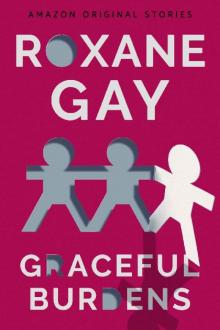 Graceful Burdens (Out of Line collection)
Graceful Burdens (Out of Line collection)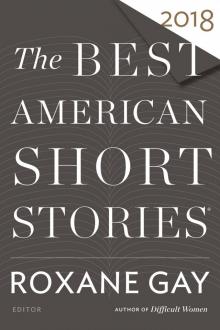 The Best American Short Stories 2018
The Best American Short Stories 2018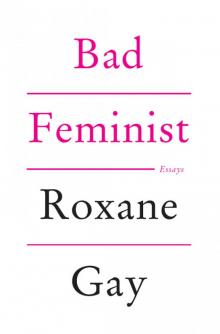 Bad Feminist
Bad Feminist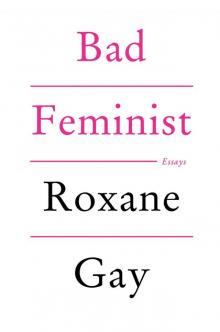 Bad Feminist: Essays
Bad Feminist: Essays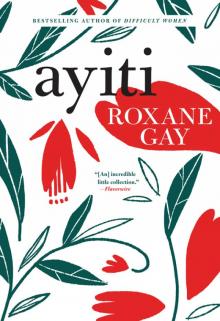 Ayiti
Ayiti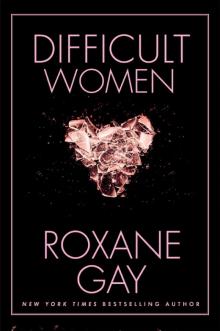 Difficult Women
Difficult Women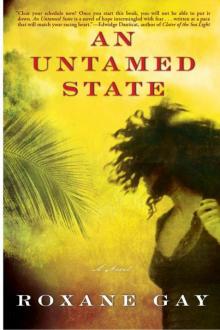 An Untamed State
An Untamed State Hunger
Hunger